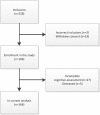The association of preoperative anxiety and depression with neurocognitive disorder following oncological surgery
- PMID: 31930514
- PMCID: PMC7064888
- DOI: 10.1002/jso.25836
The association of preoperative anxiety and depression with neurocognitive disorder following oncological surgery
Abstract
Background: The proposed underlying mechanisms of anxiety and depression, and of postoperative neurocognitive disorder (NCD), each include immune system involvement. Therefore, the aims of this study were to investigate the incidence of postoperative NCD 3 months after surgery among oncological patients undergoing surgery and to evaluate the role of preoperative anxiety and depression.
Method: A consecutive series of patients (age ≥ 18 years) undergoing surgery for the removal of solid tumors were included (n = 218). Cognitive performance was assessed preoperatively and at 3 months postoperatively. Preoperative anxiety and depression were evaluated using the Hospital Anxiety and Depression Scale.
Results: NCD affected 12.3% of elderly patients (age ≥ 70 years, n = 57) at 3 months after surgery, with executive function mostly affected. By contrast, 8.4% of younger patients (age < 70 years, n = 107) were affected, with information processing speed mostly affected. Low educational attainment was a risk factor (OR, 6.0; 95% CI, 1.9-19.0) of overall NCD, whereas preoperative anxiety was associated with decline in the domain of executive function.
Conclusion: Postoperative NCD is a complication of oncological surgery for all adults instead of the elderly only. Preoperative anxiety was associated with an increased risk of executive function decline, and low educational attainment was a key factor for overall NCD.
Keywords: cognitive dysfunction; depression; neoplasm; surgical procedure.
© 2020 The Authors. Journal of Surgical Oncology published by Wiley Periodicals, Inc.
Conflict of interest statement
The authors declare that there are no conflict of interests.
Figures


Comment in
-
Adjuvant therapy following resection of gastroenteropancreatic neuroendocrine tumors-There is hope, but more data are needed.J Surg Oncol. 2020 Sep;122(3):572. doi: 10.1002/jso.25972. Epub 2020 May 17. J Surg Oncol. 2020. PMID: 32419171 No abstract available.
References
-
- Torre LA, Bray F, Siegel RL, Ferlay J, Lortet‐Tieulent J, Jemal A. Global cancer statistics, 2012. CA Cancer J Clin. 2015;65:87‐108. - PubMed
-
- Sullivan R, Alatise OI, Anderson BO, et al. Global cancer surgery: delivering safe, affordable, and timely cancer surgery. Lancet Oncol. 2015;16:1193‐1224. - PubMed
-
- Linden W, Vodermaier A, Mackenzie R, Greig D. Anxiety and depression after cancer diagnosis: prevalence rates by cancer type, gender, and age. J Affect Disord. 2012;141:343‐351. - PubMed
-
- Vyas A, Babcock Z, Kogut S. Impact of depression treatment on health‐related quality of life among adults with cancer and depression: a population‐level analysis. J Cancer Surviv. 2017;11:624‐633. - PubMed
-
- Plas M, Rotteveel E, Izaks GJ, et al. Cognitive decline after major oncological surgery in the elderly. Eur J Cancer. 2017;86:394‐402. - PubMed
Publication types
MeSH terms
LinkOut - more resources
Full Text Sources
Other Literature Sources
Medical

